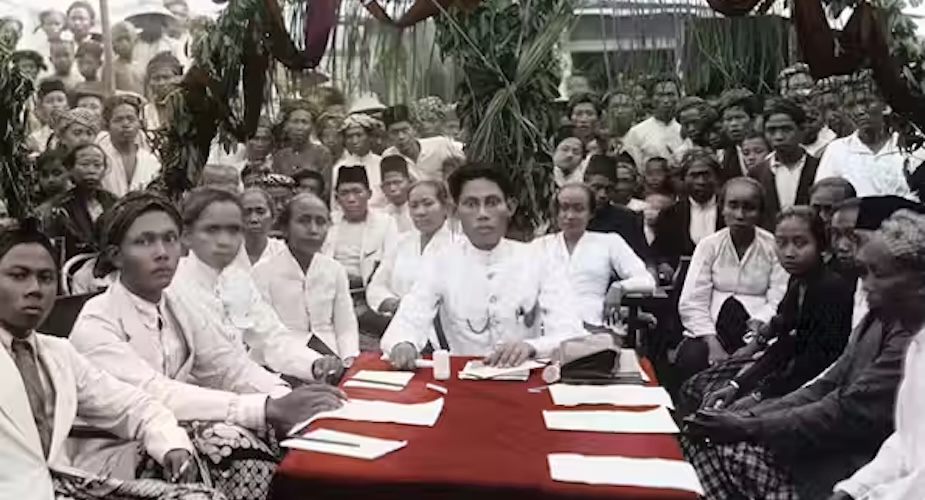The Chinese Muslim community in Surabaya even has its own mosque
Anne Dickson
The 2008 Chinese New Year Gala Dinner in Surabaya was an impressive event. Thousands of people, mainly Indonesians of Chinese descent, packed into a beautifully decorated convention hall to enjoy a banquet and entertainment. Each item was introduced in Mandarin and Indonesian, and the mayor and the American and Chinese consuls-general were present to wish the revellers well.
Just a few years ago, public displays of Chinese culture were forbidden, and a celebration like this would have been unimaginable
Just a few years ago, public displays of Chinese culture were forbidden, and a celebration like this would have been unimaginable. But even in reformasi Indonesia, this was a Chinese New Year celebration with a difference. The Gala Dinner was hosted by the Chinese Muslim Association of Indonesia (PITI). An Islamic song or two featured alongside Chinese items. In a brief address, a leader of PITI wished everyone a happy Chinese New Year and thanked those who had donated to flood victims through the organisation. Later in the proceedings, another Chinese Muslim leader led a prayer for the few Muslims present before the singing and dancing extravaganza resumed.
New-found freedom for PITI
PITI was formed in Jakarta in 1961. Along with the rest of the Chinese Indonesian community, it experienced discrimination under the Suharto regime’s assimilationist policies from the late 1960s. In 1972 the organisation had to change its name so that it was seen to be ethnically neutral. Like other Chinese organisations, its activities were restricted. Lion and dragon dancing, for example, were definitely out of the question. In 1994, authorities detained and interrogated two of PITI’s leaders in Surabaya after the organisation published sections of the Qur’an in the original Arabic with translations in Indonesian and Mandarin, in defiance of the prohibition of the public use of Chinese characters.
 |
Friday prayers at the Muhammad Cheng Ho mosqueAnne Dickson |
In post-Suharto Indonesia, PITI is free to proclaim its message loud and clear – that ‘Chineseness’ is compatible with Islam and has its place in Indonesian society. PITI believes it is important for all to hear this message in order to break down barriers between Chinese Muslims and other Muslims in Indonesia, and to make the Muslim faith more accessible to non-Muslim Chinese. In fact, PITI is now thriving in Surabaya, where the national organisation’s most active branch can be found. These days, a new edition of the controversial 1994 Qur’an translation is available for enquirers and converts alike, and includes a guide for the performance of Muslim prayers. PITI people are proud to be Muslim, proud to be Chinese and proud to be Indonesian. They want to tell everyone about it. And now they can.
Muhammad Cheng Hoo Mosque
In 2002, PITI built the first mosque in Indonesia with Chinese architecture on a large block of land in a quiet area near the heart of Surabaya. The mosque is named after Cheng Ho (Zheng He), a Chinese admiral who is said to have helped spread Islam in the archipelago in the fifteenth century. Outside the mosque there is a relief depicting Cheng Ho and a model of one of his ships. Visitors impressed by the beautiful Chinese architecture of the mosque can learn more about it, and the man after whom it was named, in a booklet published by PITI. The message is clear: Chinese Muslims have been around for centuries and even helped introduce the Islamic faith to Indonesia, so there’s nothing odd about being Chinese and Muslim.
PITI people are proud to be Muslim, proud to be Chinese and proud to be Indonesian
Next to the mosque is PITI’s East Java headquarters. The complex, which houses a pre-school, badminton courts and a canteen alongside PITI’s offices, is a hive of activity. Acupuncture is available, performed by a non-Muslim from mainland China. Mandarin language classes are held on Wednesday evenings. The busiest time of the week is Friday. Chinese Muslim friends take the chance to catch up before and after prayers, when hundreds of men of various ethnic backgrounds come to the mosque. The mosque isn’t big enough anymore to hold all those who attend, so every week temporary shelter is erected.
 |
A Catholic priest converts to IslamAnne Dickson |
With the establishment of the mosque, PITI has become more active and visible in Surabaya, and better able to fulfil its objectives. The organisation sees itself as a bridge between the primarily non-Muslim Chinese minority and the Muslim majority in Indonesia. PITI endeavours to communicate the message of Islam to Muslims and non-Muslims alike, but particularly to those of Chinese descent. Those interested in Islam or wishing to convert can find information here and consult Chinese Muslim leaders. Almost every week, at least one person – who may or may not be Chinese – converts to Islam in a simple ceremony in the mosque after the prayers or in the mosque’s office. Classes for new converts, attended by enquirers as well, are held on Saturday afternoons and Sunday mornings. As an organisation with many members who were originally from non-Muslim backgrounds, PITI is strategically placed to help people of Chinese ethnicity with their specific questions and problems as new converts.
Bridging the divide through good works
Another way PITI in Surabaya demonstrates that ‘Chineseness’ and Islam are natural companions is by holding large events, such as Chinese New Year festivities, to which both Muslims and non-Muslims are invited. After the end of the fasting month of Ramadan, PITI invites thousands to a celebration in the grounds of the mosque complex. These celebrations are clearly both Islamic and Chinese. The media is always present at such events, so PITI’s message is spread far and wide through television and newspapers. PITI also helps to build and maintain a good image of Islam, as well as raising its own profile, through its many charitable initiatives. These include disaster relief, campaigns for blood bank donations and collaborations with other organisations to provide free public medical clinics.
 |
Flood victims register for a free medical consultationAnne Dickson |
Events and activities such as these not only show that Islam is compatible with being Chinese, but also promote an image of an Islam that is peaceful, tolerant and friendly. Islam has not always been viewed favourably by members of the Chinese community, who have experienced discrimination and persecution by elements of the majority Muslim community, and who perceive Islam to be the religion of the lower classes. In other words, Islam is in need of an image overhaul in the minds of many Chinese Indonesians. And PITI is perfect for the job. ii
Anne Dickson (annelouisedickson@gmail.com) has just finished honours in Indonesian Studies at the University of Sydney.












